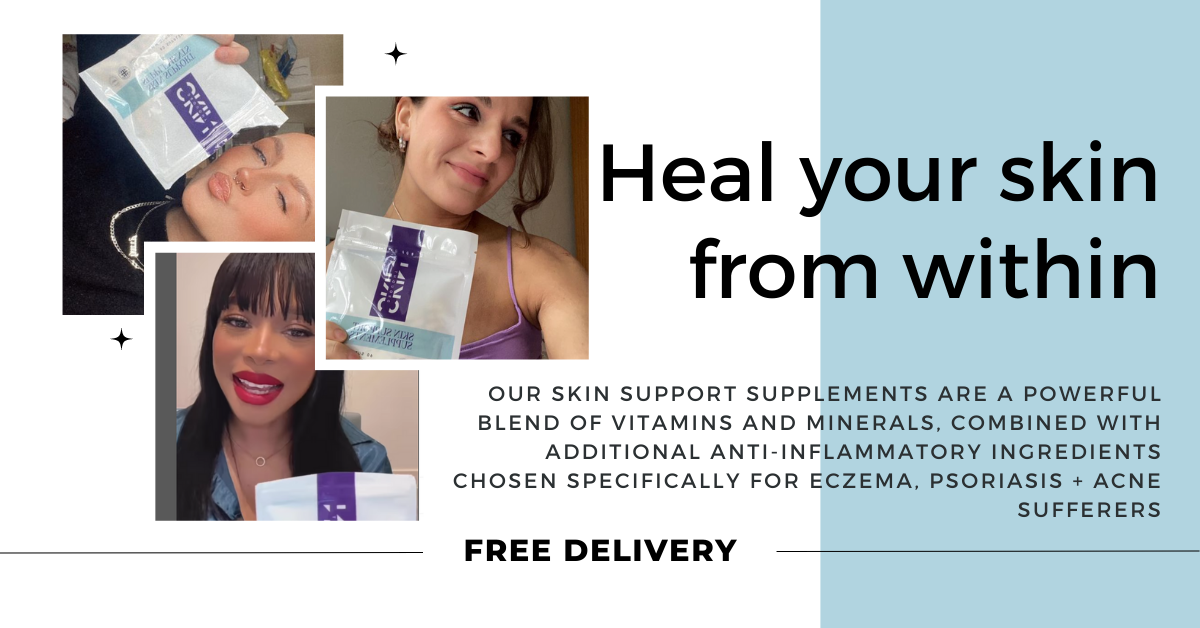Can Vitamin D Help Soothe Eczema?
Recent research has highlighted a potential connection between vitamin D and the severity or occurrence of eczema symptoms. Vitamin D, often referred to as the “sunshine vitamin,” plays a crucial role in skin health and immune system regulation, prompting increased interest in its therapeutic potential for managing eczema. This article explores the relationship between vitamin D and eczema, examining current evidence and what it could mean for those seeking relief from this chronic condition.
Vitamin D and Eczema: What’s the Connection?
Eczema is a skin condition linked to an overactive immune response and a weakened skin barrier. Vitamin D plays an important role in both of these areas—it helps regulate the immune system and supports the skin’s ability to stay strong and hydrated. Research has found that people with eczema are often more likely to have low vitamin D levels, and some studies suggest that boosting those levels may help reduce itching, dryness, and flare-ups. While vitamin D isn’t a cure, it may be a helpful piece of the puzzle in managing eczema naturally.
Vitamin D Deficiency and Eczema Symptoms
Low vitamin D levels have been linked to more frequent and severe eczema flare-ups. Without enough vitamin D, the immune system can become unbalanced, making skin more prone to inflammation. A deficiency may also weaken the skin barrier, leading to dryness, cracking, and irritation. Some studies show that children and adults with vitamin D deficiency are more likely to have itchy, widespread eczema compared to those with healthy levels. While deficiency isn’t the only cause of eczema, it may make symptoms harder to manage.
Research on Vitamin D and Eczema Flare-Ups
Studies suggest that vitamin D may play a role in reducing the frequency and severity of eczema flare-ups. Research has found that people with lower vitamin D levels often report more intense itching and dryness, while those who supplement with vitamin D sometimes notice fewer flare-ups and milder symptoms. In children especially, vitamin D supplementation has been linked to improved skin hydration and reduced inflammation. While results aren’t the same for everyone, the growing evidence points to vitamin D as a potential helper in calming eczema symptoms—especially for those who are deficient.
Best Sources of Vitamin D for Eczema Sufferers
Getting enough vitamin D can come from a mix of sunlight, food, and supplements. Sunlight is the most natural source, as your skin makes vitamin D when exposed to UV rays. Just 10–20 minutes of sun on bare skin a few times a week can help, though this depends on skin tone, location, and season. Foods rich in vitamin D include fatty fish like salmon, mackerel, and sardines, as well as fortified foods such as milk, orange juice, and cereals.
For those who struggle to meet their needs through diet and sun alone, vitamin D supplements are an option and may be especially helpful for people with eczema who are deficient. The general recommended daily amount is around 600 IU (15 mcg) for adults and 400 IU (10 mcg) for children, though some people with low levels may need more under medical supervision. It’s always best to check your vitamin D levels with a healthcare provider before supplementing, as too much can cause side effects.
Vitamin D Supplements for Eczema: Do They Help?
For people who don’t get enough vitamin D from sunlight or food, supplements may help fill the gap. Some studies show that taking vitamin D supplements can improve skin hydration, reduce inflammation, and even cut down the number of eczema flare-ups—especially in those who are deficient. Children with eczema, in particular, have shown improvement in itching and dryness when given daily vitamin D.
That said, supplements aren’t a cure-all. Results vary from person to person, and not everyone notices a big change. The best approach is to check your vitamin D levels with a healthcare provider before starting, then follow their advice on the right dose.
If you’d like to try a Vitamin D supplement, our Skin Condition Support contains 1000% RDA of Vitamin D3
Disclaimer: This article contains affiliate links. We earn a very small commission from each purchase made through these links. There is no additional cost to you. All products featured have been specifically selected as products we personally use and love. For further information, please see our disclaimer page.



